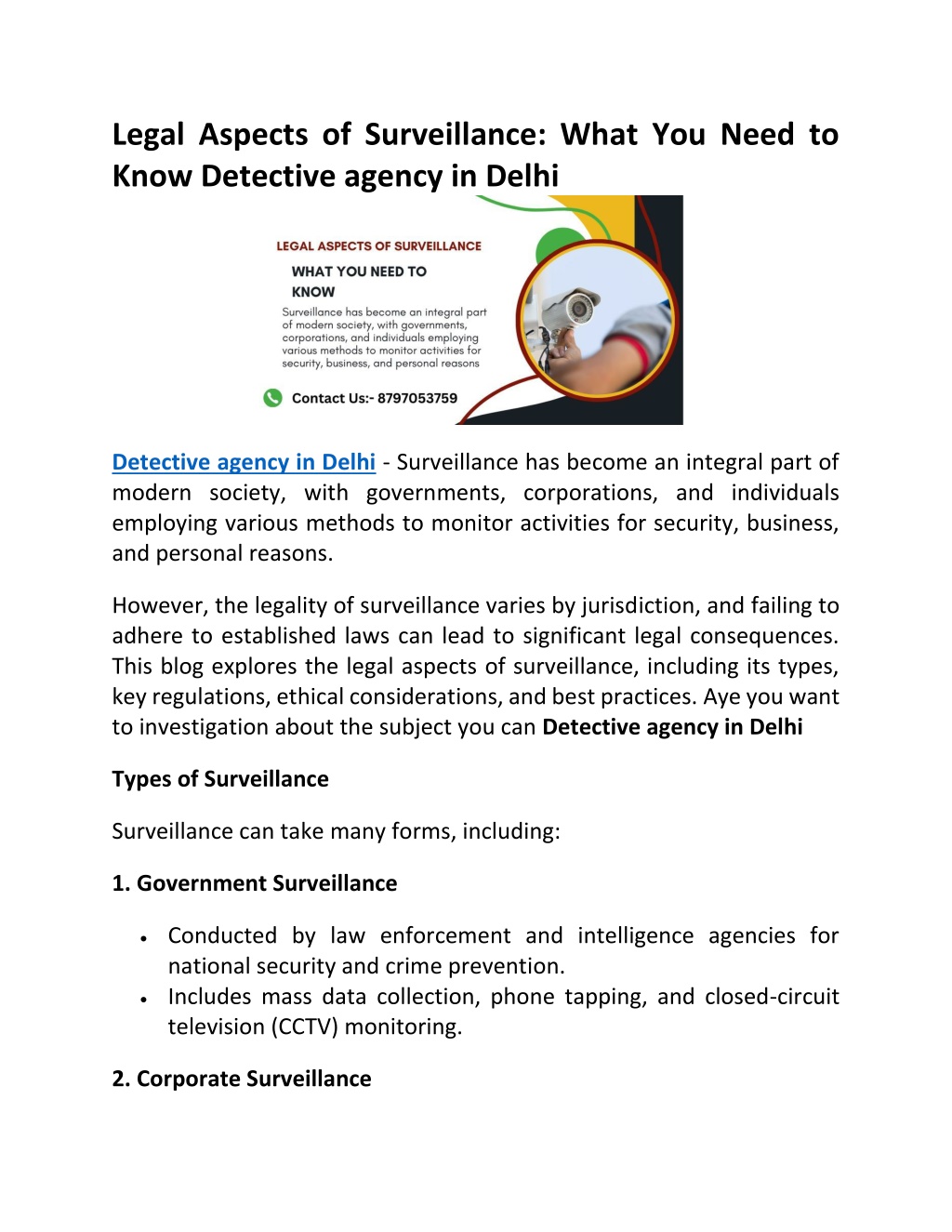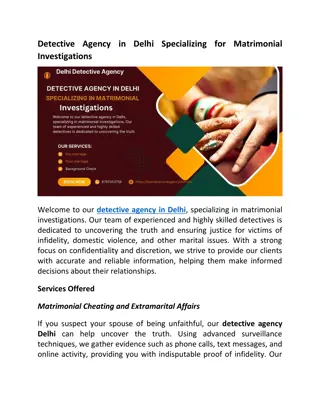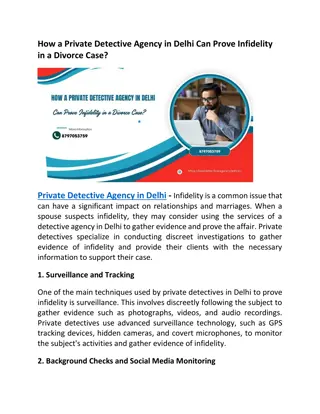
What You Need to Know Detective agency in Delhi
Detective agency in Delhi - Surveillance has become an integral part of modern society, with governments, corporations, and individuals employing various methods to monitor activities for security, business, and personal reasons.
Uploaded on | 2 Views
Download Presentation

Please find below an Image/Link to download the presentation.
The content on the website is provided AS IS for your information and personal use only. It may not be sold, licensed, or shared on other websites without obtaining consent from the author. If you encounter any issues during the download, it is possible that the publisher has removed the file from their server.
You are allowed to download the files provided on this website for personal or commercial use, subject to the condition that they are used lawfully. All files are the property of their respective owners.
The content on the website is provided AS IS for your information and personal use only. It may not be sold, licensed, or shared on other websites without obtaining consent from the author.
E N D
Presentation Transcript
Legal Aspects of Surveillance: What You Need to Know Detective agency in Delhi Detective agency in Delhi - Surveillance has become an integral part of modern society, with governments, corporations, and individuals employing various methods to monitor activities for security, business, and personal reasons. However, the legality of surveillance varies by jurisdiction, and failing to adhere to established laws can lead to significant legal consequences. This blog explores the legal aspects of surveillance, including its types, key regulations, ethical considerations, and best practices. Aye you want to investigation about the subject you can Detective agency in Delhi Types of Surveillance Surveillance can take many forms, including: 1. Government Surveillance Conducted by law enforcement and intelligence agencies for national security and crime prevention. Includes mass data collection, phone tapping, and closed-circuit television (CCTV) monitoring. 2. Corporate Surveillance
Used by businesses to monitor employees, prevent fraud, and enhance security. Includes email monitoring, keystroke logging, and biometric authentication systems. 3. Private Surveillance Performed by private investigators or individuals for personal reasons. Includes GPS tracking, social media monitoring, and hidden cameras. Legal Framework for Surveillance Laws regulating surveillance vary from country to country, but common principles apply to most legal systems: 1. Consent and Privacy Laws Many jurisdictions require consent before conducting surveillance, especially in private spaces. Unauthorized recording or tracking can be deemed illegal. 2. Wiretap Laws The U.S. has the Electronic Communications Privacy Act (ECPA) restricting wiretapping. The UK follows the Regulation of Investigatory Powers Act (RIPA) to oversee electronic surveillance. 3. Workplace Surveillance Regulations Employers must notify employees if they are being monitored. The General Data Protection Regulation (GDPR) in the EU requires transparency in employee surveillance.
4. Surveillance in Public Spaces Generally legal, but there are restrictions on how the data is used. CCTV laws in various countries ensure that video footage is not misused. 5. Data Protection Laws The GDPR, California Consumer Privacy Act (CCPA), and other regulations govern how collected surveillance data is stored and shared. Ethical Considerations Beyond legal constraints, ethical concerns play a crucial role in surveillance practices: 1. Right to Privacy Individuals should be informed when and why they are being monitored. 2. Proportionality and Necessity Surveillance should be used only when necessary and proportionate to the objective. 3. Data Security Organizations must ensure that surveillance data is securely stored and protected from unauthorized access. Best Practices for Legal Surveillance To comply with surveillance laws, consider the following best practices: 1. Obtain Proper Authorization
Seek legal permission or consent before initiating surveillance. 2. Implement Clear Policies Organizations should have transparent surveillance policies that comply with local laws. 3. Secure Data Storage Use encryption and access controls to protect collected data. 4. Regular Compliance Audits Conduct periodic reviews to ensure surveillance activities align with legal and ethical standards. 5. Inform Affected Individuals Whether in workplaces or public areas, informing individuals about surveillance ensures transparency and builds trust. Conclusion Understanding the legal aspects of surveillance is essential for governments, businesses, and individuals alike. Staying informed about the relevant laws, obtaining consent where necessary, and adhering to ethical standards can help prevent legal repercussions and promote responsible surveillance practices. Always consult legal professionals before engaging in surveillance to ensure compliance with applicable laws in your jurisdiction. Aris Global Best detective agency in Noida Delhi NCR and Detective agency in Delhi Source link:-https://bestdetectiveagencydelhi.in/2025/02/01/legal- aspects-of-surveillance-what-you-need-to-know-detective-agency-in- delhi






















